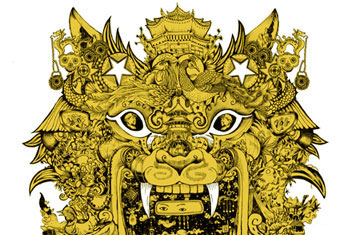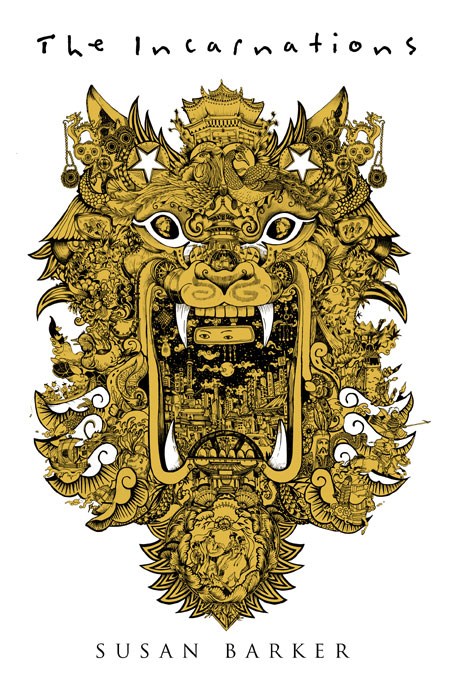The Sixth Life of Driver Wang
AN EXCERPT FROM THE INCARNATIONS, A NOVEL BY SUSAN BARKER

Through the windscreen of his taxi, Wang has seen the city change. He has seen the wrecking balls swing, bulldozers levelling streets to rubble and dust and skyscrapers rising like bamboo after the rain. Land and planning permission is bought and sold. Property developers draw circles on maps and, in weeks, all that is circled disappears; the residents exiled to the far-flung suburbs and demolition crews moving in to clear out the rest. In the decade Wang has been a taxi driver, the city has changed radically. And as the dust of construction gusts across the city, sheet after sheet, he often wonders when it will end.
Pedestrians wave him down and Wang drives them all over Beijing. He is mostly silent throughout his twelve-hour shift, and most passengers behave as though he’s not there, or as if he’s a mechanical part of the car, like the gear stick or steering wheel. They don’t censor what they say in the back seat, and some of the conversations lure Wang’s attention in. Investment bankers bragging of profits of millions of yuan. A junior-high-school student with metal braces on her teeth, describing how she lost her virginity to a saucer-eyed friend (‘I bled, but not that much...’). Scientists from the Institute of Meteorological Sciences debating the ethics of cloud-seeding – the Weather Modification Office’s strategy of firing silver iodide up into the clouds, to wring out some rain. (‘Man must defeat the Heavens,’ the woman scientist insisted, quoting Mao). Money is what his passengers talk of most. ‘How much per square metre?’ ‘How much for the upgrade?’ ‘How much do you earn?’ ‘How much?’ ‘How much?’ Beijingers are richer now than when Wang first started out as a driver, and his fares click compulsively at shiny metallic laptops and fidget with the latest gadgets in the back. They are shallow, materialistic and vain. But Wang would like to be wealthy too. To own a modern high-rise two-bedroom apartment. To send his daughter, Echo, to private school and have braces put on her teeth.
Confident that Wang is no one of importance, passengers rarely exercise caution in his cab. Wang has been privy to the offering of bribes to men in suits. To the haggling down of the price of women, bought and sold in bulk. To the trading of forged passports and negotiation of human-smuggling fees. Once a guy in his twenties hired Wang out for an afternoon. When it became apparent, as they drove from address to address, that he was dealing drugs, Wang asked what he was selling. ‘Cocaine,’ the dealer had said. ‘How does it get to Beijing?’ Wang had asked. ‘Flown to Kazakhstan in drug mules,’ he was told. ‘Stuffed in condoms in stomachs. In the soles of shoes.’ ‘Aren’t you afraid of the death penalty?’ Wang asked, and the dealer had laughed: ‘When it comes to the police, there are ways of getting off the hook.’
Lovers quarrel in his taxi. They fight about sex and abortion and extramarital affairs. Sometimes they remember he is there: ‘Shush ... the driver ...’ ‘Fuck the driver! What does what he think matter?’ And they go on with their row. Wang knows how manipulative the lovesick can be. The recklessness of those afflicted with the mental illness of romantic love. Wang’s back seat has known more melodrama than any far-fetched TV soap.
Sometimes, late at night, when passengers are drunk and lonely and heading home to an empty bed, they unburden themselves to Wang, pouring out their unhappy personal lives to this safe, anonymous taxi driver. They ask his advice. Sometimes they ask for more than his advice. One woman in her thirties, whose boss had recently ended their affair, had said casually to Wang, ‘Can you take me somewhere and fuck me? I need cheering up.’ When Wang had protested that he had a wife and child, she had laughed and said, ‘That’s never stopped any man I’ve ever known.’ The woman was plain-looking, but fiery and bold, and Wang could see what had attracted her boss. He imagined driving her to an empty car park, and shifting back the driver’s seat so she could hitch up her skirt and straddle him, and he was tempted. But he couldn’t do it. The woman stared out at the drizzly night streets of Beijing as he drove her the rest of the way home, not saying a word. Wang offered to waive her fare, but she made a point of paying him in full.
They are careless, his passengers. Not only do they spill intimate secrets in his taxi, they leave possessions behind too. Umbrellas, gloves, scarves, tubes of lipstick, cigarettes, cough drops and keys. Vials of Viagra and strips of birth-control pills. Tickets to the Beijing opera. Maps and guidebooks in Arabic, Hebrew and Japanese. Minutes from the annual meeting of the Optometrists’ Society of Tianjin. More than once Wang has leapt out of his bones at a shrill ringing in the empty back seat.
The ID on the fare receipts means any theft would be traced back to him, so Wang turns everything in to the taxi company’s lost-property depot. In nearly a decade he has only stolen one thing: a self-assembly kite in a box, the frame slotting together to make a magnificent dragon with a one-metre wing-span. Wang saw the forgotten kite in the back seat. Then he saw the receipt of the old man who owned it, poking like a tongue from the meter at the journey’s end. A stroke of luck. That weekend Wang and Echo flew the kite together in Chaoyang Park, the crimson dragon fluttering its tail as it darted over the lakes and trees. As he watched Echo that day, smiling and gazing up to the kite in the sky, Wang thought of the old man and tried not to feel bad. What’s the good of one person clinging to his morals when everyone else is so corrupt? What’s the good of that?
***
Wang is driving east down Worker’s Stadium Road when, squinting in the sun, he flips down the visor above the driver’s seat and an envelope falls on to his lap. Must be Baldy Zhang’s, he thinks. Then he sees his name. Wang pulls over into the bicycle lane and slides his thumb under the adhesive seal. The letter is printed on four sheets of A4. As he reads a woman dragging a suitcase on wheels taps on the window. Wang switches off the for-hire sign and waves her away. After reading the letter he re-folds it and stuffs it back in the envelope. Worker’s Stadium Road reverberates with engines as cars flow to the east and to the west. Ignitions growl, rickshaw bells brrring and horns beep. Migrant workers with greasy hair and padding spilling out of ripped jackets trudge up the pedestrian overpass, shouldering heavy bags. The street seems changed somehow. As though everything is a façade for something hiding beneath. He wants to call Baldy Zhang, but knows that he sleeps until dusk. Wang smokes a cigarette, then calls his wife instead.
Yida is at work and the phone rings and rings. Wang sees her in one of the private rooms at Dragonfly Massage, under the sensual, dimmer-switch-on-low lighting, standing over a customer on the massage table in her clinical white uniform. Wang sees her as a customer sees her. A pretty 29-year-old masseur with bronzed skin and a wilderness of curls that tumble and fall from any barrette or butterfly clip she uses to hold them back. Firm calves. Lips that don’t need lipstick. Hazel eyes flecked with gold. ‘Where are you from?’ customers ask when they hear her accent. And as she tells them, they nod and recoil slightly, as though the soil and toil of peasant life still clings to her skin. There are facts about his wife’s occupation Wang can’t stomach. The fact that her male clients strip to their underwear. The fact that with her bare hands (moisturized, the nails clipped) she kneads and caresses every part of the male flesh. Shoulders, lower back, buttocks, inner thighs. Her upper-arm muscles rippling with strength as she attends to her bare-chested customers in the aromatherapy oil-scented room. Wang knows what’s on a man’s mind when he is massaged by a pretty girl. And so does Yida. When she was a teenager, new to Beijing and ripe for exploitation, she worked in a parlour where bringing a client to a climax with her hand was an ordinary part of the massage routine. She’d wiped up the semen afterwards, she confessed, as casually as a waitress mopping up a spilt drink in a café.
She answers on the seventeenth ring.
‘How come it took you so long to answer?’ asks Wang.
‘The phone was in my locker ...’
‘Were you with a customer?’
‘No. I’ve had no customers yet ...’
She sighs, weary of her husband’s jealousy. ‘What is it, Wang?
Is something wrong?’
‘No. Nothing’s wrong ...’
And Wang changes his mind about telling her. He says, ‘I was thinking of you. That’s all.’
Yida softens. ‘Are you sure that there’s nothing wrong?’
‘Yes. I’m sure.’
•
Susan Barker grew up in east London and lived in Beijing for several years. She is the author of the novels Sayonara Bar and The Orientalist and the Ghost, both longlisted for the Dylan Thomas Prize. The Incarnations, published on July 3 by Doubleday, is her third novel
The Incarnations is about a taxi driver in Beijing during the Olympics and is interwoven with tales of his previous lives, from the Tang Dynasty to the Cultural Revolution. The Anthill highly recommends the novel, which is immersive, vivid and a perfect summer read. You can buy the novel on Amazon UK here, on Kindle for US customers here, or through other order options on the publisher’s page here


















